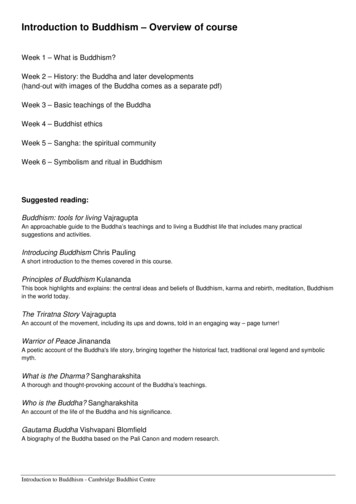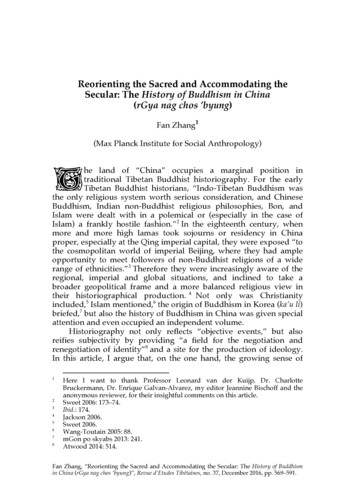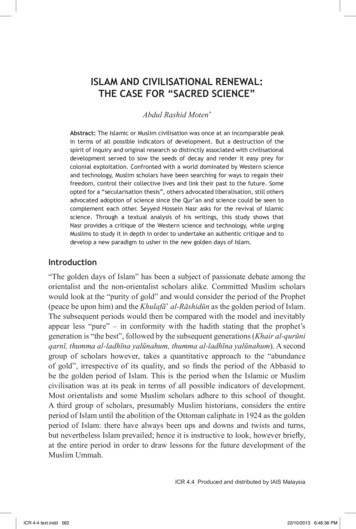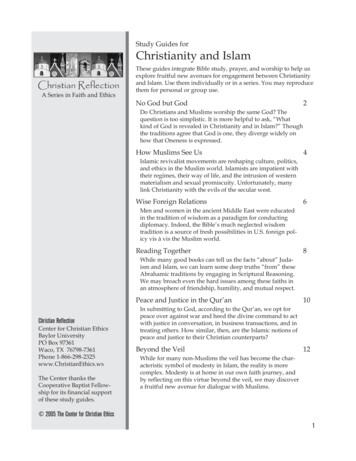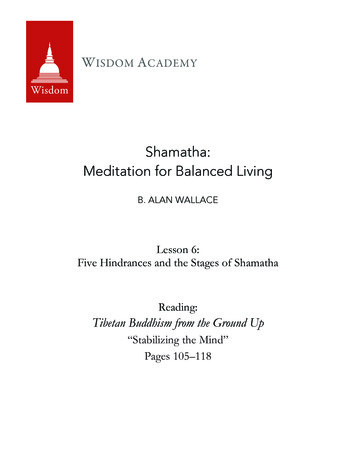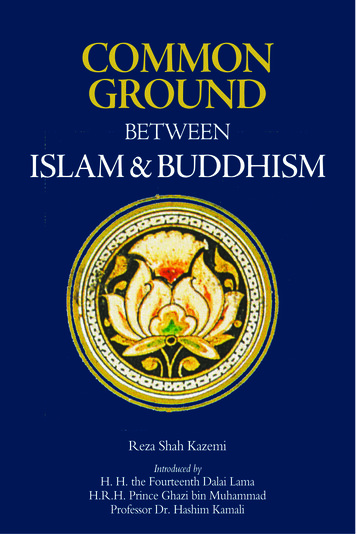
Transcription
Common GroundBetweenIslam and Buddhism
Common GroundBetweenIslam and BuddhismBy Reza Shah-KazemiWith an essay by Shaykh Hamza YusufIntroduced byH. H. the Fourteenth Dalai LamaH. R. H. Prince Ghazi bin MuhammadProfessor Mohammad Hashim Kamali
First published in 2010 byFons Vitae49 Mockingbird Valley DriveLouisville, KY 40207http://www.fonsvitae.comEmail: fonsvitaeky@aol.com Copyright The Royal Aal-Bayt Institutefor Islamic Thought, Jordan 2010Library of Congress Control Number: 2010925171ISBN 978–1891785627No part of this book may be reproducedin any form without prior permission ofthe publishers. All rights reserved.With gratitude to the Thesaurus Islamicus Foundationfor the use of the fourteenth century Qur’ānic shamsiyyalotus image found in Splendours of Qur’ān Calligraphyand Illumination by Martin Lings. We also thank JustinMajzub for his artistic rendition of this beautiful motif.Printed in Canadaiv
ContentsForeword by H. H. the Fourteenth Dalai LamaIntroduction by H. R. H. Prince Ghazi bin MuhammadPreface by Professor Mohammad Hashim KamaliAcknowledgementsviiixxviixxiiCommon Ground Between Islam and BuddhismPart One — Setting the SceneBeyond the Letter to the SpiritA Glance at HistoryQur’ānic Premises of DialogueThe Buddha as MessengerRevelation from on High or Within?The Dalai Lama and the Dynamics of DialoguePart Two — Oneness: The Highest Common Denominator1171214192429Conceiving of the OneThe UnbornBuddhist DialecticsShūnya and ShahādaLight of TranscendenceAl-Samad and DharmaGod’s FaceFanā’ and Non-dualityBaqā’ of the ‘Enlightened Ones’293033404243464951Worship of the OneBuddha in the Light of DharmaRemembrance of GodTariki and TawakkulKey to SalvationImages of the Buddha, Blessings upon the Prophet586064676973Part Three — Ethics of Detachment and CompassionDetachment: Anicca and ZuhdSufferingWorldlinessSubtle PolytheismThe ‘god’ of Desire797980828487
Contents, continuedLoving Compassion: Karunā and RahmaSource of CompassionOneness and CompassionRahma as Creator929698103Epilogue: The Common Ground of Sanctity110Buddha in the Qur’ān? by Shaykh Hamza Yusuf113Biographies of Contributors137Bibliography139
Forewordby His Holiness The Fourteenth Dalai Lamavii
In the Name of God, the Compassionate, the MercifulMay Peace and Blessings be upon the Prophet MuhammadIntroduction to Common GroundBy H. R. H. Prince Ghazi bin MuhammadThe Religions of the World and World PeaceAs of the year 2010 CE, 1431 AH, at least 80% of the world’s population of 6.7 billion humans belong to four of the world’s many religions. Four out of five people on earth are either Christian (32%),Muslim (23%), Hindu (14%) or Buddhist (12%). Since religion(from the Latin ‘re-ligio’, meaning to ‘re-tie’ [man to Heaven]) isarguably the most powerful force in shaping people’s attitudes andbehaviour — in theory if not in practice — it follows logically thatif there is to be peace and harmony in the world there must peaceand harmony between religions as such, and in particular betweenthe world’s four largest religions.On October 13th 2007, 138 of the world’s leading Muslim scholarsand intellectuals (including such figures as the Grand Muftis of Egypt,Syria, Jordan, Oman, Bosnia, Russia, and Istanbul) sent an Open Letterto the religious leaders of Christianity. It was addressed to the leaders ofthe Christian churches and denominations of the entire world, startingwith His Holiness Pope Benedict XVI. In essence, the Open Letter proposed, based on verses from the Holy Qur’ān and the Holy Bible, thatIslam and Christianity share, at their core, the twin ‘golden’ commandments of the paramount importance of loving God and loving one’sneighbour. Based on this joint common ground, it called for peace andharmony between Christians and Muslims worldwide.That Open Letter led to a historical global peace movement between Muslims and Christians specifically (as can be seen on www.acommonword.com), and whilst it has not reduced wars as such between Muslims and Christians or ended mutual hatred and prejudice,it has done a lot of good, by the Grace of God, and has noticeablychanged the tone between Muslim and Christian religious leaders andsomewhat deepened true understanding of each other’s religions in significant ways. The A Common Word initiative was certainly not aloneon the world’s stage in attempting to make things better between peopleof faith (one thinks in particular of the Alliance of Civilizations, H. M.King Abdullah of Saudi Arabia’s Interfaith Initiative and Presidentix
common ground between islam and buddhismObama’s Cairo 2009 speech), but we think it nevertheless significantthat, for example, according to the October 2009 Pew Global Reportthe percentage of Americans harbouring negative opinions about Islamwas 53% when only a few years earlier it was 59%. It is thus possible toameliorate tensions between two religious communities (even thoughconflicts and wars rage and indeed have increased in number over thatsame period of time) when religious leaders and intellectuals reach outto each other with the right religious message.It was with all these things in mind that, after detailed discussions with H.H. the 14th Dalai Lama, we conceived of the present initiative. We commissioned one of the Royal Academy’s Fellows, Dr.Reza Shah-Kazemi — a respected specialist in Islamic mysticismand a leading author in comparative religion — to write an essay onthe topic, which we then asked him to expand into this treatise. Wehope and pray that this book will be blessed with the same kind ofglobal effect between Muslims and Buddhists that A Common WordBetween Us and You did between Muslims and Christians.Why Do We Need ‘Common Ground’?The specific intention and goal of the commission was to identify aspiritual ‘Common Ground’ (authentically based on the religious sacredtexts of Islam and Buddhism) between Muslims and Buddhists that willenable both communities to love and respect each other not merely ashuman beings in general, but also as Muslims and Buddhists in particular. In other words, we hoped to find out and understand what in our twogreat religions — despite all of the many irreconcilable and unbridgeable doctrinal, theological, juridical and other differences that we dohave between us and that we cannot and must not deny — we have incommon that will enable us to practise more loving mercy and respecttowards each other more because we are Muslims and Buddhists, andnot simply because we are all human beings. We believe that, despitethe dangers of syncretism, finding religious Common Ground is fruitful, because Muslims at least will never be able to be whole-heartedlyenthusiastic about any ethic that does not even mention God or referback to Him. For God says in the Holy Qur’ān:But he who turneth away from remembrance of Me, his willbe a narrow life, and I shall bring him blind to the assembly on the Day of Resurrection. (The Holy Qur’ān, Ta Ha,20:124)x
Introduction to Common Ground By H. R. H. Prince Ghazi bin MuhammadAnd also:Restrain thyself along with those who cry unto their Lordat morn and evening, seeking His Countenance; and let notthine eyes overlook them, desiring the pomp of the life ofthe world; and obey not him whose heart We have madeheedless of Our remembrance, who followeth his own lustand whose case hath been abandoned. (The Holy Qur’ān,Al-Kahf, 18:28)This explains why we do not simply propose a version of the Second ‘Golden’ Commandment (‘Love thy Neighbour’) — versionsof which are indeed to be found in the same texts of Islam and Buddhism (just as they are to be found in the sacred texts of Judaism,Christianity, Hinduism, Confucianism and Taoism amongst otherreligions): without the First ‘Golden’ Commandment (‘Love thyGod’), the Second Commandment on its own inherently risks beingspiritually devoid of truth, and thus risks descending into a superficial sentimentalism without true virtue and goodness; it risks beinga secular ethic taking its stance on moods which we can conjure upto ourselves on occasion, requiring nothing from the soul, riskingnothing, changing nothing, deceiving all.On the other hand, one of the greatest ironies of many religiouspractitioners is that despite the fact that their religions call for mercyand respect between people, they disparage others (and deny them thatmercy and respect) if those others do not undertake the same paths ofloving mercy as them. Thus love of their own religions makes themless lovingly merciful to other people rather making them more merciful to other people! This seems to me as a Muslim to be particularlyironic, because in all four traditional Sunni Juridical Schools of Thought(Madhahib), as well as in traditional Shi’a thought and Ibadhi thought— that is to say, in all the traditional juridical schools of thought in Islam as such) — a person’s choice of religion is not grounds for hostilityagainst them (if they are not first hostile to Muslims). Rather, Muslimsare required to behave with mercy and justice to all, believers and nonbelievers alike. God says in the Holy Qur’ān:Tell those who believe to forgive those who hope not forthe days of God; in order that He may requite folk whatthey used to earn. / Whoso doeth right, it is for his soul,and whoso doeth wrong, it is against it. And afterward untoxi
common ground between islam and buddhismyour Lord ye will be brought back. (The Holy Qur’ān, AlJathiyah, 45:14–15)The same is clear in the following passage from the Holy Qur’ānwhich starts by citing a prayer of earlier believers:‘Our Lord! Make us not a trial for those who disbelieve, andforgive us, our Lord! Lo! Thou, only Thou, are the Mighty,the Wise’. / Verily ye have in them a goodly pattern for everyone who looketh to God and the Last Day. And whosoevermay turn away, lo! still God, He is the Absolute, the Ownerof Praise. / It may be that God will ordain love betweenyou and those of them with whom ye are at enmity. God isMighty, and God is Forgiving, Merciful. / God forbiddethyou not those who warred not against you on account ofreligion and drove you not out from your homes, that yeshould show them kindness and deal justly with them. Lo!God loveth the just dealers. (The Holy Qur’ān, Al-Mumtahinah, 60:5–8)Thus Muslims must on principle show loving mercy and respect toall those who are not waging war on them or driving them from theirhomes (these thus being the conditions for just, defensive war in Islam). Muslims must not make their mercy conditional upon other people’s mercy, but it is nevertheless psychologically almost inevitablethat people will better appreciate their fellows more when they knowtheir fellows are also trying to show mercy and respect to all. At leastthat was one of our chief assumptions in commissioning this book.The Common GroundTurning to the book itself, we think it not amiss to say that it hasproved to be, by the grace of God, in general a stunning piece ofscholarship and a display of depth of understanding and grandnessof soul on behalf of the author. That is not to say that every Muslim — or every Buddhist — will accept, or even understand, everything that the author says, but nevertheless it can fairly be saidthat the book is generally normative from the Islamic point of view(especially in that it is deliberately based on the Holy Qur’ān, theHadith and the insights of the great scholar and mystic Abu HamidAl-Ghazali) and that it examines all the major schools of Buddhistthought (as I understand them). Moreover, the book shows beyondxii
Introduction to Common Ground By H. R. H. Prince Ghazi bin Muhammadany reasonable doubt some very important similarities and parallelsbetween Islam and Buddhism, and in particular the following:(1) The belief in the Ultimate Truth (Al-Haqq) who is also Absolutely One, and who is Absolute Reality, and the Sourceof Grace and Guidance to human beings.(2) The belief that each soul is accountable to a principle of justice in the Hereafter, and that this principle is rooted in thevery nature of Absolute Reality.(3) The belief in the categorical moral imperative of exercising compassion and mercy to all, if not in the central cosmogonic and eschatological functions of mercy (by this wemean the idea that the world was created through Mercy,and that through Mercy we are saved and delivered).(4) The belief that human beings are capable of supra-rationalknowledge, the source both of salvation in the Hereafter andenlightenment in the here-below.(5) The belief in the possibility of a sanctified state for humanbeings, and the conviction that all should aspire to this stateof sanctity.(6) The belief in the efficacy and necessity of spiritual practice:whether this take the form of fervent prayer, contemplativemeditation, or methodic invocation.(7) The belief in the necessity of detachment from the world,from the ego and its passional desires.As regards the Buddha’s not mentioning of God as Creator, this is definitely an absolute difference between Muslims and Buddhists but ifit is understood that the One is God, and that the Buddha’s silence onthe One as Creator is not a denial as such, then it is possible to say thatthe points above certainly make for substantial ‘Common Ground’between Islam and Buddhism, despite the many unbridgeable differences between them. Certainly, these points can be taken as constituting or ‘establishing’ the core of religion — and not being ‘divided’therein, and this is precisely what God says in the Holy Qur’ān is theessential message of the most important messengers of God:He hath ordained for you that religion which He commended unto Noah, and that which We inspire in thee (Muhammad), and that which We commended unto Abraham andMoses and Jesus, saying: Establish the religion, and be notdivided therein. Dreadful for the idolaters is that unto whichxiii
common ground between islam and buddhismthou callest them. God chooseth for Himself whom He will,and guideth unto Himself him who turneth (toward Him).(The Holy Qur’ān, Al-Shura, 42:13)One might also say that these points also make up the substance ofthe Two Greatest Commandments: the belief in the One AbsoluteTruth and striving for detachment from the world, the ego and thebody through spiritual practices and striving for sanctity (and hencesupra-rational knowledge) might be considered an inverse way ofachieving the First Commandment, and the categorical imperativeof compassion and mercy is clearly the Second Commandment indifferent words, if not the First Commandment as well (with the immortality of the soul being indicated in both Commandments by thenaming of the whole ‘heart’). And God knows best.People of the Scripture (Ahl Al-Kitab)All of the above leads us to conclude as Muslims that the Buddha,whose basic guidance one in ten people on earth have been inprinciple following for the last 2500 years, was, in all likelihood— and God knows best — one of God’s great Messengers, even ifmany Muslims will not accept everything in the Pali Canon as beingauthentically attributable to the Buddha. For if the Buddha is notmentioned in the Holy Qur’ān by name, nevertheless it is clear thatGod says that every people had their own ‘warner’ and that therewere Messengers not mentioned in the Holy Qur’ān:Lo! We have sent thee with the Truth, a bearer of glad tidingsand a warner; and there is not a nation but a warner hathpassed among them. (The Holy Qur’ān, Al-Fatir, 35:24)Verily We sent messengers before thee, among them thoseof whom We have told thee, and some of whom We havenot told thee; and it was not given to any messenger that heshould bring a portent save by God’s leave, but when God’scommandment cometh (the cause) is judged aright, and thefollowers of vanity will then be lost. (The Holy Qur’ān, AlGhafir, 40:78)It seems to us then that the Umayyads and the Abbasids were entirely correct in regarding Buddhists as if they were ‘Ahl Al-Kitab’(‘Fellow People of a Revealed Scripture’). This is in fact how millions of ordinary Muslim believers have unspokenly regarded theirxiv
Introduction to Common Ground By H. R. H. Prince Ghazi bin Muhammadpious Buddhists neighbours for hundreds of years, despite whattheir scholars will tell them about doctrinal difference between thetwo faiths.On a more personal note, may I say that I had read Zen Buddhist texts as a younger man when studying in the West (such assome of the writings of D.T. Suzuki and such as Eugen Herrigel’sseminal Zen in the Art of Archery). I had greatly appreciated them,without for all that being fully able to situate Buddhism in the context of my own faith, Islam. More recently, I had noticed in myselfan effect when meeting with H. H. the Dalai Lama. It was simplythis: I performed the five daily prayers with greater concentration,and during the rest of the day I was better able to monitor myown thoughts, and censor and control my own impulses more easily. I did not have any particular urge to go out and learn moreabout Buddhism, as one might expect, but I nevertheless realisedthat there was something positive taking place. I asked my friendShaykh Hamza Yusuf Hanson (who I knew had read a lot aboutBuddhism) why he thought this happened, and he wisely answeredthat this was because: ‘Buddhists are heirs to a very powerful spiritual training’. Thus I am personally very gratified to learn of theunderlying Common Ground between Islam and Buddhism in anexplicit manner. Indeed, as a Muslim I am relieved and delighted— if I may say so — to know that one eighth of the world who isnot Muslim practises Buddhism and makes the practice of compassion and mercy the centre of their lives (in theory at least). AndI hope that this book will lead to Muslims and Buddhists vying inthe compassion and mercy which is at the core of both their religions. God says in the Holy Qur’ān:And unto thee have We revealed the Scripture with thetruth, confirming whatever Scripture was before it, and awatcher over it. So judge between them by that which Godhath revealed, and follow not their desires away from thetruth which hath come unto thee. For each We have appointed a law and a way. Had God willed He could havemade you one community. But that He may try you by thatwhich He hath given you (He hath made you as ye are).So vie one with another in good works. Unto God ye willall return, and He will then inform you of that wherein yediffer. (The Holy Qur’ān, Al-Ma’idah, 5:48)xv
common ground between islam and buddhismEarlier Common Ground ?It would be amiss not to mention that although this book may represent one of the first — if not the first — major attempt at a scholarlyspiritual comparison between Buddhism as such and Islam as suchin our modern age, there have been some very brilliant and seriousintellectual and spiritual exchanges in the past between Islam and the‘Three (Great) Teachings’ of China (Confucianism, Taoism and Buddhism). This is evinced in particular by the works of indigenous Chinese Muslims (the ‘Han Kitab’) during the sixteenth, seventeenth andeighteenth centuries, and in particular the two figures Wang Daiyu(ca. 1570–1660 CE) and Liu Zhi (ca. 1670–1724 CE). This work hasbeen recently brought to light and translated into English (ironically,it is more or less unknown in Arabic and in modern Chinese) by Professors William Chittick, Sachiko Murata and Tu Weiming. Currentlythis team of scholars has produced the two following seminal books:(1) Chinese Gleams of Sufi Light: Wang Tai-yü’s ‘Great Learningof the Pure and Real’ and Liu Chih’s ‘Displaying the Concealmentof the Real Realm’ (State University of New York Press, 2000); (2)The Sage Learning of Liu Zhi: Islamic Thought in Confucian Terms(Cambridge, MA, Harvard University Asia Centre, 2009). They arealso working on Wang Daiyu’s The Real Commentary on the TrueTeaching (first published in 1642 CE). These works represent a critical resource for mutual understanding between China and Islam, andscholars interested in delving further into spiritual comparisons between Islam and Buddhism (as well as Confucianism and Taoism)could not do better than to start here. We hope that these treasures willbe translated into Arabic and modern Chinese and made widely available. When we make full use of the wisdom of the past, and combineit with the knowledge of today, we are better equipped to face theuncertainties of the future.And all praise be to God, the Lord of the worlds.The opinions expressed above represent solely Prince Ghazi’s personal and private views and do not represent the views of the government and people of Jordan in any way; nor are they meant tobear upon political issues in any form whatsoever.H. R. H. Prince Ghazi bin MuhammadMarch 2010xvi
Prefaceby Professor Mohammad Hashim KamaliThe Common Word initiative of one hundred and thirty-eight Muslimreligious leaders and academics, which advanced Muslim-Christiandialogue along theological grounds and themes of common concernto both religions, has borne fruit thanks to the earnest subsequentefforts and organizational support of numerous distinguished personalities on both sides. The Royal Aal Bayt Foundation for IslamicThought in Jordan took the initiative in September 2007 to formulatea Muslim response to Pope Benedict XVI’s somewhat controversialRegensberg lecture of the previous year. In the meantime, followup encounters took place between the Pope and Muslim leaders.Instead of engaging with the Pope from a defensive posture, theMuslim leaders launched the Common Word initiative reflectingthe Qur’ānic invocation asking Muslims to call on the followers ofscripture to come to a word common between us and you. (3:64) asa focus of their dialogue. The positive response from the Christianside led to several encounters and international conferences whichopened new vistas of beneficial dialogue with their Muslim counterparts.Muslim leaders are now proposing a second chapter to ACommon Word, this time between Islam and Buddhism: CommonGround. The present book advances a seminal discourse exploringIslam’s commonalities with the teachings of the Buddha. Like itsantecedent, which found common scriptural grounds between theBible and the Qur’ān, the present attempt underscores spiritual andmoral affinities between the Qur’ān, the Pali Canon, the Mahayanascriptures and other Buddhist texts.This book does not shy away from acknowledging the existenceof many fundamental differences, even unbridgeable gaps, separating Islam and Buddhism — starting with the leading question,whether Buddhism can be called a theistic religion, or even a religion at all. Answers to such questions are given, and the author advances an equally persuasive discourse on significant spiritual andmoral commonalities between Islam and Buddhism. It is an attemptat understanding some of the central principles of Buddhism in thelight of Islamic spirituality that uncovers considerable commonground between them. Buddhism is more of a network of spiritualxvii
common ground between islam and buddhismschools of thought than a unified religion, yet all Buddhist schoolsare united on the fundamental teachings of Buddha as expressed inthe Pali Canon and manifested especially in its two leading schools,the Theravada and the Mahayana.Common Ground begins by drawing a distinction between thedoctrinal creed (‘aqīda) of Islam and its spiritual wisdom (ma‘rifa)which relates more closely to contemplation, purification of the heart,and the mystical dimensions which both religious traditions tendtowards. Even at the level of ‘aqīda, although Buddhism is clearlynon-theistic, the ultimate Reality affirmed by Buddhist thought, andthe supreme goal sought by it, corresponds closely with the Essence(al-Dhāt) of God in Islam. Buddhism cultivates consciousness ofthe Absolute, and the quest for its realization through ethical teaching and praxis. The transcendental journey and quest toward the Absolute also shares common ground with what is known in Islam asdhikr Allāh (remembrance of God). Dharma, a major principle ofBuddhism, comprises several meanings, including teaching, norm,law, truth and reality. It is the nearest equivalent of al-Haqq in Islam,which similarly comprises a number of parallel meanings. Suffering (dukkha), another theme of Buddhism, emanates from an innatethirst (tanhā) of one’s untamed and unbridled ego for the perishablethings of this world. One must overcome thirst for the ephemeralboth for the sake of one’s own relief from suffering and for the sakeof liberating others from it. The opposite of suffering is not only astate of ease but that of the highest good, or Nirvāna—the Absolutewhich transcends the ego in all its states. Karunā (loving compassion), in the sense of participation in the suffering of others, is a nearequivalent of Rahmah in Islam, both of which are expressive, on thehuman plane, of a principle which is rooted in the consciousness ofthe Absolute. This thought provoking study of Buddhist teachingsalso finds parallels between Shūnya (the Void) and the first Shahāda(‘no god but God’), especially in their negation of false deities;between Anicca (impermanence) and Zuhd (detachment from thematerial world); between Tanhā (desire, thirst) and hawā (capricious desire); and between anattā (no soul) and fanā’ (extinctionof the self). Only the Dharma, Nirvāna, and Shūnya—what wouldbe called the essence of God, beyond all conceivable qualities, inIslamic terms—is absolute, eternal and infinite; all else is transient,and thirst for the transient is the seed of all suffering. MahayanaBuddhism, which is seen by many as coming close in some respectsxviii
Preface by Professor Mohammad Hashim Kamalito belief in a ‘Personal God’ with diverse traits, without whose graceand mercy one cannot attain salvation, comes close on a metaphysical plane to the Islamic conception of divinity. The practice of theNembutsu (veneration of the celestial Buddha) is predicated on thepower of the absolute Other, or Tariki (surrender of one’s self-will tothe Eternal other), which strikingly resembles the Islamic doctrineof Tawakkul (reliance and trust in God).Analogous rather than identical as these concepts may be, thiseffort to find common ground in the essence of spirituality and devotion between Islam and Buddhism is a substantial one, and couldwell present a keenly persuasive basis of harmony between theiradherents.The book also develops fresh insights into the teachings of theQur’ān and Sunna, suggesting that Buddhists may from the Islamicviewpoint be regarded as followers of a revealed scripture and thusconsidered as Ahl al-Kitāb. A theological recognition of this kind islikely to enable the adherents of both religions to appreciate and mutually respect the religious teachings of the other. An earnest attemptis thus made to help Muslims to see Buddhism as a true religion orDīn, and Buddhists to see Islam as an authentic Dharma.Muslim schools and jurists have differed on the understandingof the Qur’ānic designation Ahl al-Kitāb. Whereas many have confined the term to only the Jews and Christians, the Hanafī and Shāfi‘īschools maintain it comprises all who have followed a prophet anda revealed scripture, which would include those who believed in thepsalms of David, and the scrolls (suhuf) of Abraham. Many haveextended this status to Zoroastrians and Sabaeans. Imam al-Shāfi‘ī(d. 820 CE) is critical of those who denied the status of Ahl al-Kitābto Zoroastrians on the authority of an unequivocal ruling of caliph‘Alī b. Abī Tālib (d. 661 CE) in their favour.The proponents of this open interpretation of Ahl al-Kitāb haverelied on the Qur’ānic verse (87:19), which refers as sources ofguidance to the earliest books (al-suhuf al-ūlā), the Books of Abraham and Moses; and then also (Q.26:196), which refers to the Booksof earlier peoples (zubur al-awwalīn), that concurred with much ofthe Qur’ānic guidance. The word zubur (scriptures) also occurs in(Q.35:25) immediately following a reference to the apostles of oldthat came with clear signs and Scriptures (bi’l-bayyināt wa bi’zzubur). Three other references to zubur in the Qur’ān (3:184; 16:44;54:52) also sustain the understanding that zubur were Scriptures ofxix
common ground between islam and buddhismlesser magnitude compared to the Torah, Bible, and Qur’ān, but revealed books nevertheless, as all references to zubur must elicit approval if not veneration; in any case, it is unlikely the Qur’ān wouldmake repeated references to doubtful and false scriptures. It thusbecomes obvious upon scrutiny that Ahl al-Kitāb in the Qur’ān arenot confined to only the Jews and Christians.On the other hand, those who restrict the category of Ahl al-Kitābto the Jews and Christians quote in authority the Qur’ān (6:156),which declares that Books were revealed to two groups before, butthe context where this phrase occurs actually questions rather thanendorses the spirit of such a limitation. Let us briefly examine thecontext: The verse (6:156) immediately follows two other verses,one of which affirms the veracity of the Torah that contained guidance and light. The succeeding verse refers to the Qur’ān itself as ablessed Book (kitābun mubārakun) and an authoritative source. Andthen comes the verse (6:156): Lest you should say (think) that Bookswere sent down to two [groups] of people [only] before us, and forour part, we remained unacquainted (with a revealed Book). Thetone of the discourse here is expressive of the favour bestowed byGod upon the Muslims through the revelation of the Qur’ān to them,so that they do not say that God’s favour was confined to only twogroups of people. Therefore, to give this verse as evidence in support of confining the Ahl al-Kitāb to Jews and Christians is unwarranted and leads to an indefensible conclusion. Yet the restrictive interpretation may have been the result, not only of how the scripturalevidence was understood, but also of historical factors, differentialpractices th
Islam and Christianity share, at their core, the twin ‘golden’ command - ments of the paramount importance of loving God and loving one’s neighbour. Based on this joint common ground, it called for peace and harmony between Christians and Muslims worldwide. That O


